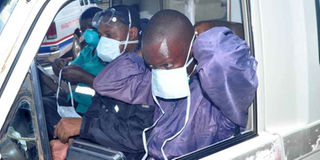Health workers shunning patients over coronavirus

Health workers seen in an ambulance on April 1, 2020, preparing before setting off to pick the 11 new cases from Entebbe Mission Guest House where they are quarantined and evacuate them to Entebbe Regional Referral Hospital. PHOTO BY OTAGE STEPHEN
What you need to know:
- Issue. The numbers of infected persons in the country now stands at 44 with the latest reports indicating the last 11 were members of Watoto Church children choir.
The government has admitted health workers have been shunning patients for fear of contracting coronavirus because they do not have protective gear.
In his latest address to the nation to clarify his earlier measures on combating further spread of coronavirus, President Museveni said he had received reports that health workers were running away from patients but defended their actions saying they lacked protective gear.
The numbers of infected persons in the country now stands at 44 with the latest reports indicating the last 11 were members of Watoto Church children choir who were under quarantine after their return from abroad.
Mr Museveni explained that when he inquired from Ministry of Health permanent secretary, Dr Diana Atwine, he was informed that although they had made orders for additional protective gear, they were many countries in waiting for the same.
“There is an outcry for protective gears for health workers... I have also been watching television in countries like United Kingdom and Spain, there is a big outcry for the protective clothes. I have checked with PS Ministry of Health. She told me of the arrangements they are making. I want it in writing. I want to be sure of the source and quantity,” Mr Museveni said.
He added: “She told me the problem they have been having is that many countries are ordering from China. I think there is some plane about to arrive. The health workers are running away from patients because they don’t have protective gears and fear to touch them (patients). With protective gears, they will be confident.”
Mr Museveni said he would also consult some factories to locally manufacture the products.
He cited an example of factories which were making waragi (gin) but are now making sanitisers to disinfect hands which are believed to be carriers of the virus. He however, warned people against drinking the sanitiser made out of waragi as it has 80 per cent alcohol up from the 30 or 40 per cent and would kill them.
But there are many things affecting service delivery in hospitals including transport to take the health workers from their homes to work.
Ms Martha Niwagaba’s patient who needed a referral to Butabika hospital from Naguru hospital on Tuesday could not move as the medical worker who had admitted her the previous night had not showed up and other workers were not willing to initiate the transfer.
“We needed an ambulance which we got after the contact person said we will pay Shs60,000 for fuel. We were willing to pay the money. But how do we move? We needed a referral to Butabika hospital but the health workers said we had to wait for the person who had admitted us. This person didn’t come to work because there was no transport. Our patient was now showing signs of mental illness. There is confusion. Some of us had to walk to hospital to take food to the patient,” Ms Niwagaba said in an interview.
The President banned private transport on Monday but apologised on Tuesday saying the abrupt announcement was to deny people time to prepare to travel to villages which would in turn be disastrous as they would transfer the virus, thus creating another health burden.
He directed police to release all cars they impounded immediately after his announcement on Monday.
“It is true when I announced the ban on private transport, it was already 9 O’clock and it was starting at 10 O’clock. I did it deliberately. Some people want to drive to the village but you will transfer the virus. That is why we had to surprise you. Sorry about that. The idea was that no time to roam around. I give amnesty to those whose vehicles were impounded. The police were right. The other people were right because they were not aware. I was also right,” Mr Museveni said.
Dr Atwine had not returned this newspaper’s repeated calls by press time to establish how many protective gears had been ordered and when they were expected to arrive in the country.
The government first introduced 13 measures on March 18, including partial lockdown for two weeks. Days later, the borders were also closed.
According to Mr Museveni, some of the first measures like allowing private cars to move have since been abused and now starting this week, were stopped for 14 days to monitor the prevalence.
The President allowed diplomatic mission cars to move only between their homes, hospital and markets in liaison with the national coronavirus taskforce chaired by Prime Minister Ruhakana Rugunda. The judiciary will also be working but only recording cases until the country is free from the pandemic.
Although the President reviewed the number of people for a gathering or meeting from 10 to five persons, he allowed those who wish to wed during this period to continue but not to exceed 10 members.
He said the national taskforce was still working on the vulnerable groups who will be given food for at least a month during the lockdown.
However, Mr Museveni said attention will be given to mostly individuals who were earning a daily income to support their families but were affected by this lockdown.
[email protected]



